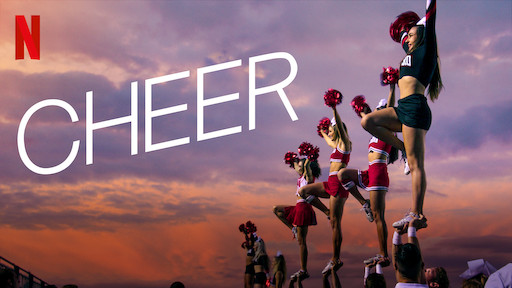Cheer on Netflix is a great study of the elements that make for a compelling narrative. And it demonstrates how story in documentary is really no different than in fiction.
The 6-hour series is about the national champion cheerleading team at a community college in Texas looking to repeat. And it focuses on a variety of characters whose personal situations are replete with challenges. This helps make it easy for the audience to bond with them, and care about what happens. On both an individual level and a team level, there’s the potential for a strong emotional “rooting interest” as people the audience comes to care about suffer setbacks and deal with difficulties.
Non-fiction is no different from fiction in that it has the most impact when it “feels like a story.” Finding the best story in documentary projects (as in fiction) requires choosing subjects with care, where there’s a maximum amount of conflict and problems — and thus, hopefully a strong connection between viewers and the people on screen.
Reality or “unscripted” TV also tries to do this, although some shows have difficulty forging that substantive emotional link, and they can feel more like disposable entertainment — where there is fighting, spectacle and entertainment value, but a limited reason to really care and find it all meaningful. (And sometimes a lack of believability when the plots and character actions are clearly manipulated for dramatic effect.)
Cheer, by contrast, goes for the heart. These aren’t forced conflicts between people the audience might look down on in some way. It comes off as more of an inspiring journey for underdogs one can’t help but feel for.
In my book The Idea, I talk about the seven attributes of a viable story, in any medium, using an acronym of the word PROBLEM, since every story, at its heart, is about one. Each letter in PROBLEM stands for something, and Cheer delivers on all of them:
PUNISHING: these cheerleaders get beaten up, literally, in their struggle to perfect their routine.
RELATABLE: it’s easy to invest in and care about these people, and what they’re trying to do with their incredible talents, while facing personal difficulties.
ORIGINAL: there’s never been a documentary series about a competitive cheerleading team, that I know of, and the filmmakers’ approach to exploring this interesting subculture makes for a fresh version of a “sports movie.”
BELIEVABLE: Documentaries tend to have “believable” covered in that they’re showing things that really happened.
LIFE-ALTERING: The stakes go beyond the national championship, to larger life issues for the characters. It feels like it all really matters and a lot is on the line.
ENTERTAINING: Not only are their incredible routines high-spectacle in and of themselves, but outsized personalities dealing with great adversity and the tension over what will happen provides a lot of emotional “candy.”
MEANINGFUL: It turns out that it’s not just about cheerleading, and resonates on a human level in universal, primal ways.
The cheer team has 40 members, but the show really focuses on five of them. And four of the five have backgrounds with so much pain and deprivation of one sort or another, that they each communicate some version of, “If I didn’t have this team, I’d be dead or in jail.” (The fifth is a celebrity cheerleader who has her own struggles of a different ilk.)
It’s this element that I think has the power to most hook the audience and make them invest on more than just a surface level. It’s no longer about whether you find competitive cheerleading intriguing. It’s not even about cheerleading anymore. It’s about young people who have a lot of problems but one clear talent, who find a parent figure in their coach, Monica, who is perhaps the most meaningful adult relationship in their lives. And the lessons learned as they dedicate themselves to teamwork and self-improvement feel like they will be helpful to them for the rest of their lives, even if this is the last year they will ever be cheerleaders.
That last aspect gives their journey to the national competition another level of stakes and emotional impact: the fact that there is no “professional cheerleading” to pursue, after this season is over. They will probably never cheer again. This is potentially their last chance, their last hurrah.
So it feels Relatable, Life-Altering and Meaningful — three story elements that might not have been there, had the filmmakers not found the extreme underdog characters and delved into their emotional lives, or if the coach wasn’t such a beloved parent figure to all of them, and if it was just about putting on a good routine.
But at the same time, it IS about that, too. Along with all this “heart,” there is also an entertaining “sports movie” at the heart of the series, a “Sports Fleece,” in Save the Cat parlance. You have a team facing a lot of obstacles, trying to do the seemingly impossible, and you won’t know if they’ll achieve it or not until the very end. As I’ve written about before in comparing the best stories to the best sporting events, it helps when the “team” (or main character) faces one disaster after another on the road to the final climax. And Cheer definitely doesn’t disappoint in that regard.
When people ask me these days what I’ve been watching that impacted me the most, Cheeris the answer. Sometimes I find the strongest examples of great story in a documentary series or film. And they can demonstrate to us writers what our fictional creations need, to have the best chance at emotionally connecting with millions of people.


Thanks, Eric for the tip! I saw it listed but just hesitated because so much of that can tend to be too much drama. I am intrigued now with such a great break down that you provided. That was definitely helpful.
I also recommend “Unbelievable “ on Netflix. It’s one of the best miniseries I’ve seen lately with great drama and mystery. And a very emotionally compelling story. And the issues of sexual violence are so important.